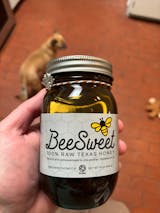Bee Sweet honey does an excellent job maintaining bee hives on our property, including offering advice for the success of the hive and optimum honey production. I highly recommend.
Sherry, thank you so much for your continued support. We truly appreciate all that you’ve done for us—and for the bees.
This honey is like if there was a movie about bees finding the ultimate trove of honey and organizing to steal it. But it's not cute or ironic. It's not an animated movie. It's serious with long, moody conversations between the bee thieves and the bee cops. The twist -- the honey is so good, every single bee on the con is doublecrossing one another. The honey is too sweet to cooperate. And here art imitates life. This honey is so good, if I couldn't buy it, I'd steal it.
Zak, thank you for your continued support and for sharing such an amazing review. Your business truly helps us keep our bees thriving—thank you for being a part of what we do.
100% recommended, excellent quality, presentation, flavor, texture, good communication with the seller.... thank you and I will continue buying 🐝🐝🐝👍🏼
José, thank you so much for supporting us!
We have purchased Bee Sweet Honey quite a few times. Beautiful color and rich delicious flavor.
Chris, thank you for your continue support!


